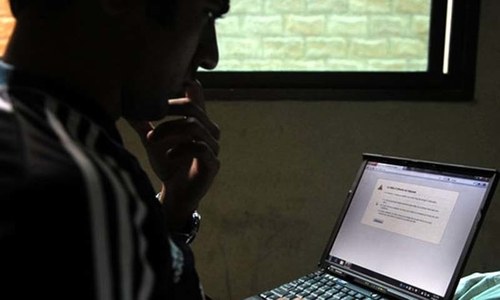ISLAMABAD: While parliament considers a controversial cybercrime bill that seeks to regulate the Internet, the Supreme Court has been asked to order the government to introduce suitable laws to censor ‘objectionable material’ online in order to protect children.
The plea is part of suggestions submitted to the court by Asif Luqman Qazi, the heir of the late Jamaat-i-Islami (JI) emir Qazi Hussain Ahmed, through his counsel Akram Sheikh on Monday.
The former JI chief had petitioned the court in 2012 against what he considered a rise in the levels of obscenity in the electronic media.
A three-judge Supreme Court bench, headed by Chief Justice Anwar Zaheer Jamali, is expected to take up the matter on Tuesday, which includes the former JI chief’s petitions, as well as a letter, written by retired Justice Wajihuddin Ahmed to the chief justice, seeking directions to set appropriate standards to check obscenity in media content, particularly dramas on different TV channels.
Asif Luqman replaced Qazi Hussain in July 8, 2013 when Hanif Abbas, one of the complainants, lamented before the Supreme Court that the party JI had lost interest in the case after its former leader’s death.
The petitioners had originally raised concerns about the broadcast of illegal Indian channels by cable operators, obscene and vulgar dramas on Pakistani channels, immoral advertisements, illegal CD channels distributed by cable networks, and, in particular, entertainment segments in news bulletins on Pakistani news channels.
The late JI chief’s son adds ‘undesirable Internet content’ to petition regarding ‘vulgarity’ on electronic media
Now, in a concise statement submitted to the court on Monday, Asif Luqman acknowledged that the Internet was emerging as a powerful tool that was essential to the education of children, but at the same time, parents feared the “dark side of the Internet”.
The ultimate responsibility of “saving the children and youth” lies with the government, Internet service providers and parents themselves, the statement notes. “Government [can] promulgate laws [to limit] the obscenity readily available to the children and youth and [ensure] its implementation through national law enforcement officials,” the statement read.
“There is no doubt that regulating obscene material online is a difficult task because the architecture of the web is set up so that users can access information stored in computers all over the world and almost anyone can create a website without significant barriers,” the petition noted, and provided a detailed list of technical measures the government could take to block undesirable content.
These suggestions include the use of techniques such as TCP/IP blocking, DNS filtering, URL filtering, Packet filtering and VPN blocking, to regulate access to obscene content. The statement also proposes that parents use software such as NetNanny and WebWatcher and McAfee Safe Eyes to keep an eye on their children’s web activity.
It also calls on the industry, i.e. Internet service providers, to improve filtering, blocking and monitoring technologies. It also called for the introduction of a content rating system for the Internet to shield children from inappropriate content.
Calling for a content rating system for television channels as well, the report said that Pemra could introduce an effective code of conduct for the electronic media which required them to refrain from airing shows that are not considered ‘family friendly’, i.e. programmes with sexual themes, explicit or obscene visuals and language and violence, etc.
The Prevention of Electronic Crimes Bill 2015, which seeks to regulate cyberspace, was recently passed by the National Assembly and is now being considered by the Senate. However, the statement made no mention of this law when it called upon the government to promulgate laws to regulate online content.
Published in Dawn, May 24th, 2016



![Pakistan's porn uproar – click[bait] this India "bird sex" analysis Pakistan's porn uproar – click[bait] this India "bird sex" analysis](https://i.dawn.com/medium/2015/01/54c0f5b1e5180.jpg)










































